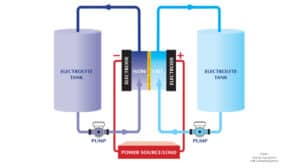
What is a flow battery?
A flow battery, also known as a redox flow battery (from the words reduction and oxidation), is a liquid-based rechargeable cell. In a traditional battery, the electrolyte is the medium through which electrons can travel between the cathode and anode. In a flow battery, the anode and cathode themselves are electrolyte solutions.
In the most simple iteration of a flow battery, the electrochemical cell consists of two half-cells that are each connected to an electrolyte tank. The two tanks are filled with the negatively charged cathode and the positively charged anode respectively. The half-cells are separated by a porous membrane through which ions are exchanged. They are also each attached to the current collector which joins the cell with the power load. Energy is released or stored by the continuous circulation of the electrolyte solution through the half-cells.
Common materials for flow batteries include vanadium, which is favored because of its ability to exist in four states of oxidation, crucial in the reduction and oxidation process. Iron chromium, zinc bromine, and zinc ion, are also typical materials for flow batteries.
What are the advantages and disadvantages of flow batteries?
Flow batteries are still being researched, but studies suggest that they lack the same degradation that can be found in lithium batteries. This means that they potentially have a much longer lifespan. Some project that flow batteries can last up to 30 years. This makes it a good choice for larger and longer-term applications.
The flow battery is also easily scalable. Larger tanks and a more concentrated electrolyte solution can be used. However, because of its large mass, flow batteries are not as conveniently portable as lithium-ion batteries, making them more suitable to stationary energy storage uses.
Because flow batteries do not use the same flammable electrolyte material as lithium-ion, they are supposedly safer, removing the issue of flammability of the battery cell. They are also less likely to experience thermal runaway.
One key disadvantage of flow batteries is its lower energy capacity. With the convenience and high capacity of lithium batteries, it can be difficult for flow batteries to compete. Another disadvantage is its greater upfront cost. Because the setup itself is larger, it can cost more to install flow batteries. However, because of its long lifespan, it is possible that the cost of ownership is more affordable in the long run.
The main application of flow batteries that is being looked at is for energy storage. This ranges from small-scale uses for homes that use renewable energy, to large-scale grid storage.
Flow Battery Applications
Some are also looking into flow batteries for electric vehicles. The technology is still immature, but the concept would borrow from traditional fuel powered cars where the fluid inside the battery would be replenished with a fresh electrolyte solution. This arrangement would remove the long time it takes to recharge an EV battery, potentially becoming a much more convenient solution.
Testing Flow Batteries
Arbin’s FBTS has been designed specifically for flow batteries. The charge/discharge flow battery testing system can range from small research-grade single cells up to 300kW stacks. Like Arbin’s other battery test equipment, the FBTS is highly customizable to individual research needs. Third party pumps and other hardware can be easily integrated with the system, and the electronic circuitry is easily programmable using Arbin’s MITS Pro Software.
While the adoption of flow batteries is still slow, and lithium-ion still holds the largest market share for the foreseeable future, it is possible that flow batteries will play an important role in the future of energy storage as the world moves towards green energy sources. As flow battery research continues to grow, new chemistries and improvements will be made, pushing flow batteries to be a stronger contender in the field of energy storage solutions.
Speak with an expert today!


